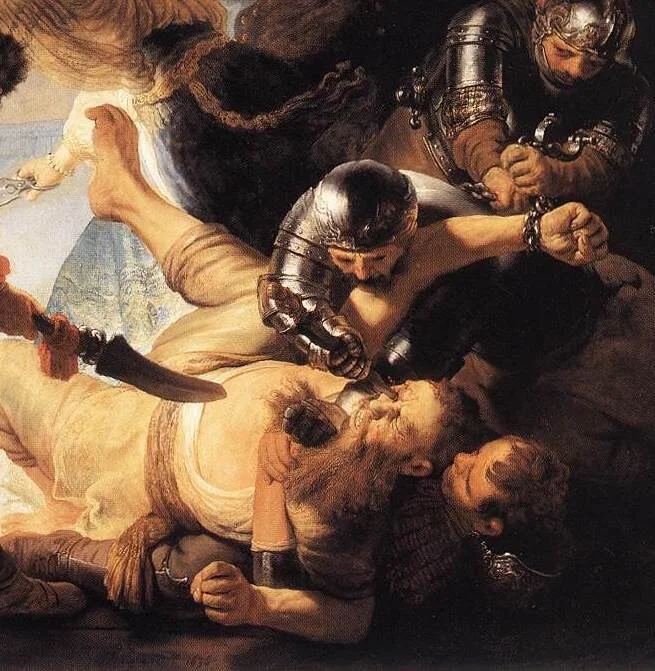Lent Series: Judges -- Samson
In the third post of our Lent series on the Book of Judges, Melanie Clark reflects on Samson's relationship with God, in all the messiness of his motivations.
Judges 15
In comparison with the other Old Testament Judges, it’s easy not to take Samson very seriously. He is no military leader and hardly a willing deliverer of Israel. Instead he is a brawny, brawling, amoral adventurer. A swaggering, audacious Lothario with a penchant for Philistine women.
At the beginning of his saga, however, we are led to believe that Samson will be a saviour. Before his conception an angel appeared to his then barren Mother and told her that she would bear a son who would be Nazirite – one dedicated to the special service of God, bound by the vows of abstaining from alcohol, shaving or cutting of their hair, and from contact with a corpse. Samson’s powers of extraordinary physical strength are God-given by divine election, but he doesn’t use them in God’s service for the good of Israel. Samson’s attacks against the Philistines don’t stem from a desire to deliver the people of Israel, but from his passion for women and revenge.
In the Book of Judges, Samson’s story further escalates a downward spiral traced in the character of the Judges and the sin of the people. Samson, consecrated in the womb, callously disregards his divine status by violating his Nazirite vows, and speaks to God only twice, in moments of acute distress. His weakness for Philistine women results in his downfall when Delilah, the third and final of his dangerous liaisons, cuts off his hair leaving him stripped of his powers, captured by the Philistines, and blinded. His story has been viewed by Biblical commentators as a cautionary tale of a potential leader who loses his strength through amoral behaviour and disregard for God. The ancient Rabbis deemed Samson as the ‘least worthy Judge’. So what can we learn from this Judge during Lent?
Chapter 15, which we have heard this evening, comes towards the end of Samson’s narrative, not long before he meets Delilah. It further exaggerates (and exaggeration is a central part of his story) Samson’s extraordinary, divinely-enabled strength and his disregard for his Nazirite status. It is full or hyperbole fit for a super-hero comic book.
The chapter opens with Samson feeling sexually frustrated and going to seek out the wife he had previously vehemently repudiated. Ever brimming with confidence, Samson takes along a kid – the ancient Israelite version of a box of Milk Tray. When his wife’s father explains that he thought Samson had rejected his daughter and so had given her to another, his rage is ignited and this leads to a course of action which verges on the ridiculous. Samson captures 300 foxes, attaches torches to their tales, and then sets them free to spread fire over all the Philistine’s crops and vineyards. When eventually the Judean army hand Samson over to the Philistines the hyperbole that has characterized the Samson narrative reaches new heights. With the club of a donkey’s jawbone (here he is disregarding a Nazirite vow by touching a corpse), he slaughters one thousand of his opponents. After the slaughter the tired but swaggering Samson quips with God: ‘are you going to reward me, the hero of Israel, by letting me die of thirst?’ Despite Samson’s cheek, God answers this demand by opening up a spring so that Samson can be revived.
Before we disregard Samson’s story as a verging-on-the-ridiculous, cautionary tale, which hardly provides a role-model for Lent, we need to understand it within the context in which it was written. It is there that the message of this story – one that is useful for Lent - becomes apparent. The story of Samson would have been told and retold and would have grown in the telling, emphasizing the sense of folktale found in its exaggeration and humour. It was cast in this final form during the Baylonian exile and is coloured by the Israelite experience of exile, defeat and foreign domination, and their need for escapism and hope.
Behind the superhuman antics and womanizing ways this story has deep theological concerns. Essentially it is about Samson’s relationship with God. The exiled people of Israel could be edified by its message: that whatever sin they commit, whatever punishment they might have to endure, God would never abandon them. Even at the very nadir of Samson’s story, when he is blinded, powerless and captured, God is present. Ironically it is at this point, with the utter disempowerment of the once superhumanly powerful, that Samson comes closest to delivering the Israelites from their oppressors by killing thousands in his own death when he demolishes a Philistine Temple. At this point Samson finally realises he is totally dependent on God. He asks for strength when all his powers have been taken away, and God answers.
So what can we take away from Samson’s story that can help us in Lent? This is a story which shows God fully involved in the messiness of human existence with all its failings and mistaken motivations. When we make mistakes during Lent, which we’re bound to do, when we are led by our own desires, rather than the way of the cross, we can think of Samson, and remember that God is with us in all our messiness and despite our failings will always hear us. Samson’s story is also a salutary reminder that true power comes from our relationship with God, and central to that relationship is our obedience and the acknowledgement of our dependency on His grace. Samson’s story tells us that God’s saving grace and power can be most keenly felt when we are stripped back to our most vulnerable, when we acknowledge our dependency above all other things. And what better time to experience that than in Lent?



